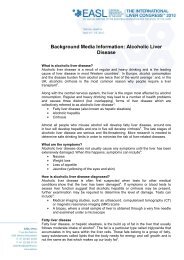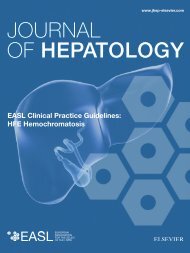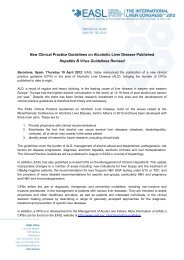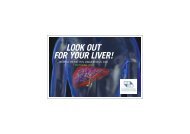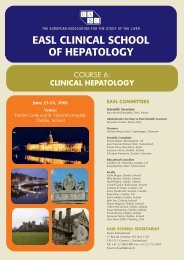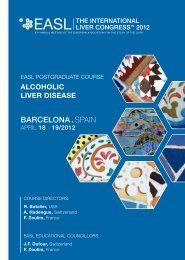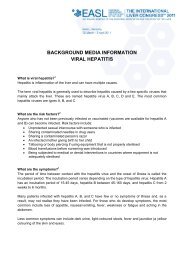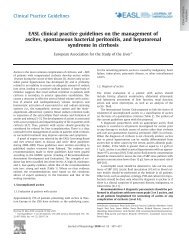Hepatocellular Carcinoma Backgrounder EASL - European ...
Hepatocellular Carcinoma Backgrounder EASL - European ...
Hepatocellular Carcinoma Backgrounder EASL - European ...
You also want an ePaper? Increase the reach of your titles
YUMPU automatically turns print PDFs into web optimized ePapers that Google loves.
BACKGROUND MEDIA INFORMATION<br />
HEPATOCELLULAR CARCINOMA<br />
What is hepatocellular carcinoma (HCC)<br />
HCC is a cancer originating in liver cells and is one of the most common types of tumour. 1<br />
Worldwide, HCC accounts for approximately 5.4% of all cancers 1 and causes 662,000 deaths per<br />
year. 2 It is the fifth most common cause of cancer in men and the eighth most common cause in<br />
women. 3 In China and Sub-Saharan Africa, HCC is the most common form of cancer. 4<br />
What are the risk factors<br />
The following causes of liver damage have been shown to increase the risk of HCC: 1<br />
Viral hepatitis (persistent HCV/HBV infection)<br />
Cirrhosis (alcohol, haemochromatosis, primary biliary cirrhosis)<br />
Aflatoxin (a toxin produced by the Aspergillus fungus, a mould that grows on food stored<br />
incorrectly, usually seen in Southern Asia and Sub-Saharan Africa)<br />
Parasite infections (seen in some areas of Southern Asia and Sub-Saharan Africa)<br />
It is often difficult to determine HCC’s exact cause since it can occur 20-30 years after the liver<br />
injury (such as hepatitis infection).<br />
HCC is so prevalent in Sub-Saharan Africa and Southeast Asia due to high rates of HCV and HBV<br />
infection. 1 In western countries, alcoholism and viral hepatitis are the leading causes of cirrhosis<br />
and subsequent HCC. 5<br />
What are the symptoms<br />
Symptoms of liver cancer are often vague and may include the following: 6<br />
Fatigue<br />
Weight loss<br />
Poor appetite<br />
Abdominal pain or discomfort<br />
Jaundice (yellowing of the eyes and skin)
How is HCC diagnosed 6<br />
Liver disease cannot be diagnosed by routine blood tests. Most patients with liver cancer have<br />
associated liver disease (such as cirrhosis) and, therefore, their liver blood tests may not be<br />
normal, even when cancer is not present.<br />
The most widely used specialised blood test for diagnosing HCC is alpha-fetoprotein (AFP). This is<br />
a protein normally formed by liver cells in the foetus. High levels of this protein in adult blood can<br />
be indicative of liver cancer. However, increased levels of AFP can also be seen in patients with<br />
chronic hepatitis and other types of liver disease, even without cancer. Additionally, a considerable<br />
number of HCCs develop in the absence of changes in AFP levels.<br />
A number of different medical imaging techniques can be also used to aid diagnosis. Ultrasound<br />
examination is usually the first technique used if a doctor suspects liver cancer. Using this<br />
technique, the internal organs can be viewed on a screen and abnormalities detected. A<br />
computerised axial tomography (CT scan) is also commonly used where pictures are taken of thin<br />
sections of the body as it moves through the CT scanner. Magnetic resonance imaging (MRI) is<br />
another type of scan that can provide very clear images of internal organs.<br />
Sometimes a liver biopsy is performed, where a small sample of liver is obtained through a very<br />
fine needle. The sample is then studied under a microscope to determine whether the cells are<br />
cancerous.<br />
How is HCC treated<br />
Surgery may be an option if tumours within the liver are small, although the cancer is likely to recur<br />
in 50-60% of patients. Unfortunately, due to extensive disease or poor liver function, only 10-20%<br />
of patients are suitable for surgery. 7<br />
For some, a liver transplant may be the only option. Following a successful transplantation, 75-<br />
80% of patients will survive for more than five years. 8<br />
Systemic therapies, such as cytotoxic chemotherapies or hormonal compounds, have not shown<br />
any survival benefit in advanced HCC. 9<br />
The current standard of treatment in HCC is the multikinase inhibitor sorafenib, which has proven<br />
survival benefit in patients with advanced HCC. 9<br />
Hepatocarcinogenesis is a complex process involving different pathways. Novel inhibitors targeting<br />
these important signalling pathways to stop the progression of the carcinogenesis are currently<br />
being studied in clinical trials (phase I to III). The data from these studies will establish the<br />
substances’ potential in mono- and combination-therapy for HCC. 9
What is the long-term prognosis<br />
Prognosis is usually poor because only 10-20% of cancers are suitable for surgery. If the cancer<br />
cannot be completely removed, the disease may be fatal within three to six months. 10<br />
Can HCC be prevented<br />
Although currently one of the most common worldwide causes of cancer death, the incidence of<br />
HCC could be reduced through vaccination against HBV virus, screening and treatment for HCV<br />
infections and reduction of alcoholic liver disease. 1 However, because the latency period between<br />
hepatic damage and the development of HCC is so long, it may be many years before HCC<br />
incidence decreases from these interventions.<br />
References<br />
1 Kumar Vinay, Nelso Fausto and Abul Abbas. Robbins & Cotran Pathologic Basis of Disease, Seventh<br />
Edition. Saunders; 2004.<br />
2 Cancer fact sheet. World Health Organisation. February 2006.<br />
http://www.who.int/mediacentre/factsheets/fs297/en/ accessed 19.03.10<br />
3 Weber S, et al. Liver and bile duct cancer. In Abeloff MD, et al. Clinical Oncology. 3rd ed. Philadelphia, Pa.:<br />
Saunders Elsevier; 2004:1981-2011.<br />
4 WHO Disease and injury country estimates". World Health Organization. 2009.<br />
http://www.who.int/healthinfo/global_burden_disease/estimates_country/en/index.html. Retrieved Nov. 11, 2009.<br />
5 Nguyen T et al. Alcohol abuse and chronic hepatitis C. Current Hepatitis Reports. 2007. 6; 3: 119-124.<br />
6 Liver Cancer. Medicine Net. Available at http://www.medicinenet.com/liver_cancer/page5.htm accessed<br />
19.03.10<br />
7 <strong>Hepatocellular</strong> <strong>Carcinoma</strong>. Wikipedia. Available at http://en.wikipedia.org/wiki/<strong>Hepatocellular</strong>_carcinoma<br />
accessed 29.03.10<br />
8 Liver transplant. NHS Clinical Knowledge Summary. Available at<br />
http://www.cks.nhs.uk/patient_information_leaflet/liver_transplant# accessed 29.03.10<br />
9 Worns M A et al. Novel inhibitors in development for hepatocellular carcinoma. Expert Opin. Investig.Drugs (2010)<br />
19(5)<br />
10 <strong>Hepatocellular</strong> <strong>Carcinoma</strong>. Medline Plus. Available at<br />
http://www.nlm.nih.gov/medlineplus/ency/article/000280.htm accessed 19.03.10



